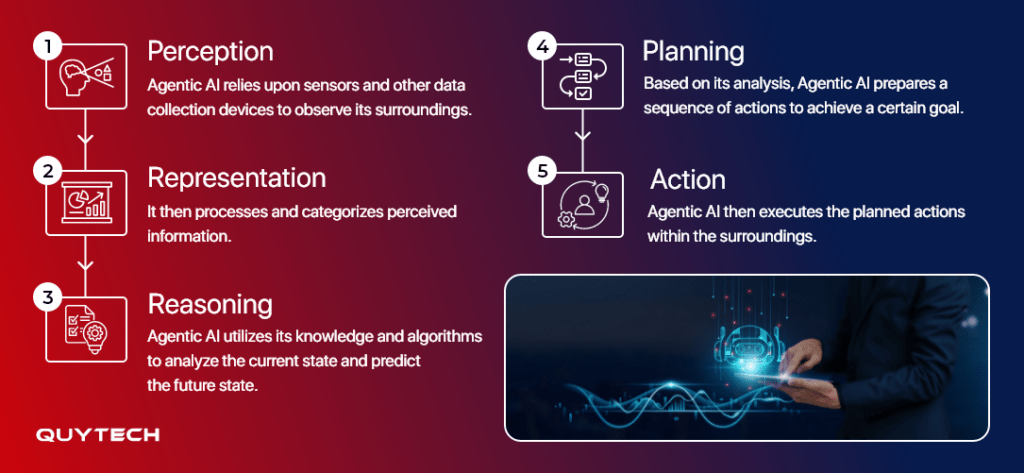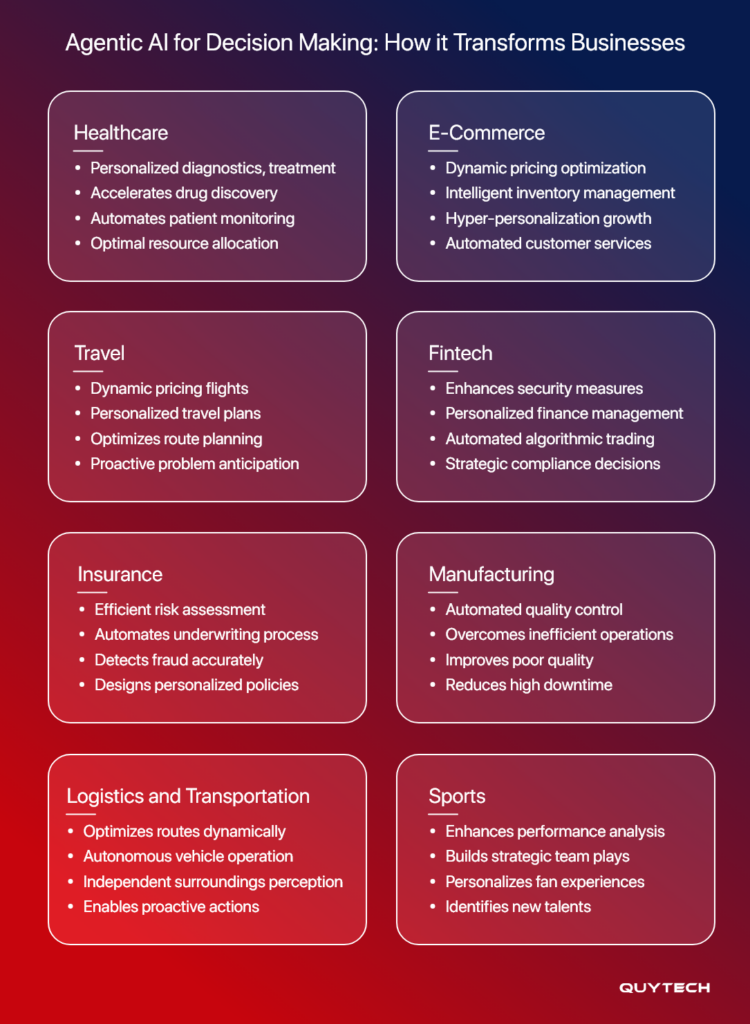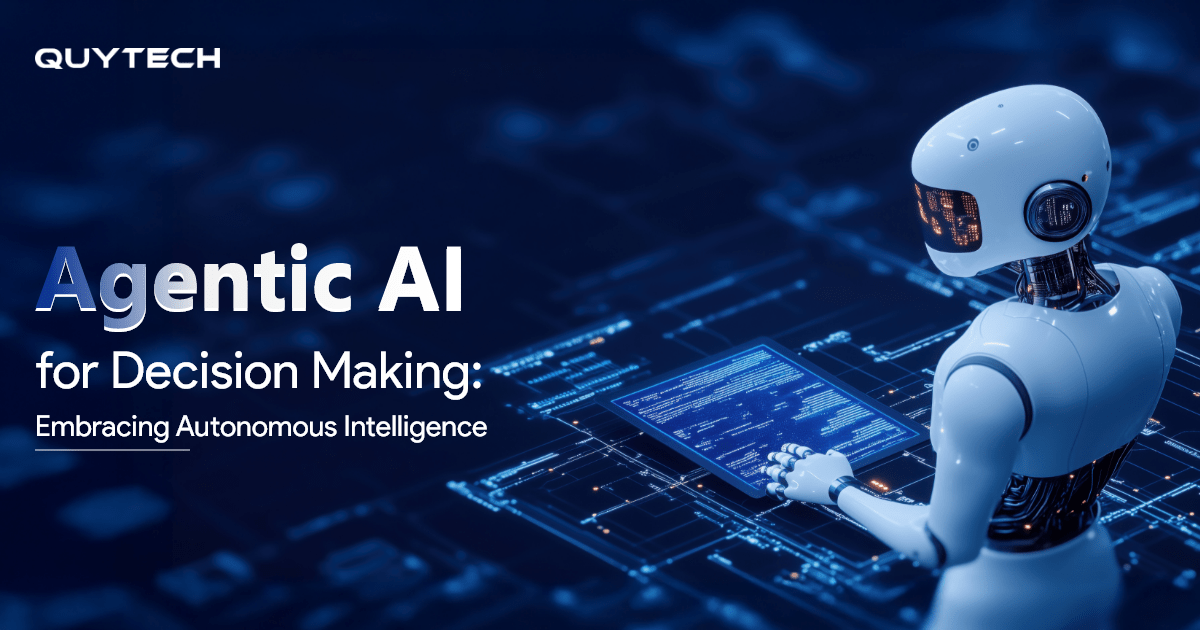When we hear about artificial intelligence, one thing that comes to mind is automation. But did you know that artificial intelligence has evolved way beyond just automation? Here, we are talking about the newest innovation, Agentic AI. Agentic AI solutions and the integration of AI agents are bringing autonomous intelligence and decision-making to redefine how a business runs its operations.
Self-driving cars are the best and easiest-to-understand example of Agentic AI. These cars don’t require manual intervention at any stage. They can perceive, plan, make decisions, and act. The AI we all used to know was just about supporting human decision-making, but the growing adoption of Agentic AI has made Agentic AI-powered solutions capable of autonomous decision-making.
As per a report by Gartner, Agentic AI is projected to autonomously troubleshoot 80% of the common customer service problems by 2029. This will reduce the overall operational costs by 30% and improve efficiency and productivity to a significant extent. Agentic AI is not limited to revolutionizing customer support services, it has the capability to transform various aspects (specifically, where intelligent decision-making is required) of a business.
Wondering how?
Let’s dig deeper into this blog that highlights everything about Agentic AI for decision-making.
What is Agentic AI
Before moving forward to read about the role of Agentic AI in autonomous decision-making, let’s have a quick look at what it is.
Agentic AI is an artificial intelligence system that acts independently to collect data from its surroundings, processes that data to make decisions, and takes action to achieve a certain goal.
These agents leverage top technologies, like Large Language Models, Reinforcement Learning, Computer Vision, Knowledge Graphs, Natural Language Processing, Simulation Environments, Memory and Context Management Systems, and others to offer decision-making capabilities to accomplish multiple tasks.
Explore More: AI Agents vs. AI Chatbots: In-Depth Comparison Guide
Types of Agentic AI
Based on the specific task one wants an Agentic AI solution or AI agent to perform, there could be several types of Agentic AI, including:
- Autonomous Agents
- Goal-Oriented Agents
- Reflex Agents
- Learning Agents
- Collaborative Agents
- Hybrid Agents
Read in detail: Types of AI Agents: Use Cases, Benefits, and Challenges
Agentic AI for Decision-Making: How Does it Work
Agentic AI follows a stepwise approach to making decisions that are accurate and reliable. Here is how it works:

- Perception
Agentic AI relies upon sensors and other data collection devices to observe its surroundings.
- Representation
It then processes and categorizes perceived information.
- Reasoning
Agentic AI utilizes its knowledge and algorithms to analyze the current state and predict the
future state.
- Planning
Based on its analysis, Agentic AI prepares a sequence of actions to achieve a certain goal.
- Action
Agentic AI then executes the planned actions within the surroundings.
Apart from independent decision-making, another best part of an Agentic AI is its ability to automatically learn and evolve to improve how it works and makes decisions.
Advantages of Agentic AI for Decision-Making
Agentic AI in decision-making offers immense benefits to those who implement it in their solutions or technical infrastructure. Let’s check out these benefits:
Enhanced Efficiency and Speed
Agentic artificial intelligence automates routine and repetitive tasks by making rule-based decisions. It not only minimizes dependency on human resources but also improves efficiency and speed. Besides, Agentic AI also ensures a faster response time to evolving market conditions or customers’ changing requirements.
Improved Accuracy
Agentic AI, when used for decision-making, provides critical insights by analyzing vast amounts of data. It can automatically make decisions based on the goals to be achieved or previous customers’ interactions. Agentic AI also offers consistent decision quality, which delivers an exceptional experience.
Better Business Strategies
Intelligent agents in decision-making can make the most of complex datasets to offer insights and uncover hidden patterns, market trends, future demands, and more. It can automatically consider all possible simulation scenarios and situations for planning all possible decisions and choosing the best one when required.
Scalability and Growth
By implementing AI agents in autonomous decision-making, you can amplify your business growth while scaling your operations seamlessly. Furthermore, Agentic AI can auto-learn and adapt to changing environments, which eliminates the need for continuous monitoring and training of the Agentic AI system.
Agentic AI for Decision-Making: How it Transforms Businesses
Independent decision-making or autonomous decision-making businesses, from healthcare, fintech, travel, sports, and other domains, overcome challenges associated with speed, accuracy, and more. Let’s understand them in detail:

Healthcare
By leveraging Agentic AI decision-making, healthcare companies can personalize diagnostics and treatment, accelerate drug discovery and development, automate patient monitoring and alerting, and ensure optimal resource allocation.
Using AI agents for decision-making, hospitals, clinics, and other healthcare institutions can offer precise and proactive care. These agents make the most of complex datasets for making quick and accurate decisions for diagnosis, designing personalized treatment plans, and more.
E-Commerce
Agentic AI in e-commerce and retail can automatically analyze market trends and competitor pricing to set the pricing dynamically as the demand fluctuates. There is no human intervention required for optimizing pricing strategies and managing inventory to avoid stock-outs and inventory overflow.
Agentic AI for decision-making facilitates hyper-personalization, intelligent inventory management, and automated customer services, ultimately contributing to your store’s growth and profitability.
You may like to read: AI Agents in Customer Service: Benefits, Use Cases, Real-World Examples, and More
Travel
Travel companies can integrate Agentic AI for decision-making to dynamically set pricing for flights and accommodation according to demand. It automatically enables travel businesses to maximize revenue while offering personalized travel plans to travellers.
Agentic AI can also independently make decisions about route planning and logistics. It can optimize flight paths and help with crew scheduling and baggage handling. AI agents can also anticipate potential travel problems that may occur due to bad weather conditions. Based on this, it can automatically proactively offer alternatives to passengers.
Similar Read: AI Agent in Hospitality: Benefits, Use Cases, Examples, and More
Fintech
Agentic AI in decision automation in fintech can enhance security and offer personalized finance management plans. From fraud detection, prevention, and automated algorithmic trading to ensuring adherence to compliance and risks, Agentic AI can make strategic decisions for all crucial tasks.
Read More: Agentic AI For Financial Advisors: Use Cases, Benefits, and More
Insurance
For the insurance sector, Agentic AI can efficiently and accurately assess risks and process claims. Insurance companies can utilize Agentic AI’s potential to automate underwriting, detect fraud, process claims, and design personalized policies.
Agentic AI can help insurance companies save time and costs while ensuring complete accuracy in assessing risks.
You may also be interested in: AI Agents in Sales: Types, Benefits, Stats, Use Cases, Features, and More
Manufacturing
Agentic AI implementation in manufacturing businesses facilitates automated decision-making for quality control. Agentic AI solutions can automatically and continuously inspect products for defects.
Agentic AI being used for decision-making can overcome challenges like inefficient operations, poor quality control, and high downtime.
Also read: AI Agents in Real Estate: Revolutionizing Property Valuation
Logistics and Transportation
Self-driving cars or autonomous vehicles are the biggest way Agentic AI is transforming the logistics and transportation industry. Agentic AI integrated in self-driving cars, trucks, drones, and other vehicles can optimize routes, take dynamic decisions, and do a lot of other things by independently perceiving from surroundings, making decisions, and taking actions.
Sports
The sports industry can utilize Agentic AI’s decision-making capabilities to enhance performance analysis to improve players’ performance, and build strategic team strategies. AI agents can also help with strategic game planning, personalizing fan experiences, identifying new talents, and more.
Also Read: Top 10 AI Agents in 2025
Implementing Agentic AI for Decision-Making into Your Business
Here is the stepwise process you can follow to integrate or utilize Agentic AI for making decisions for your business.
Step 1: Define Clear Goals
Prepare a list including goals you want to achieve and mentioning the decisions that you want Agentic AI to take in different scenarios. Moreover, mention whether those decisions are normal or have a strategic impact on your business.
Mention how you are going to measure the accuracy of the decisions made by Agentic AI. For this, define measurable goals or the metrics to measure the same.
Step 2: Select the Right Agentic AI Architecture
The next crucial step is to design the architecture for your agent. The choice of this architecture depends mainly on the complexity of the decision-making task that the Agent will perform. Choose which type of agent you want to accomplish your tasks and make decisions. You can select from Reflex, Model-based, Goal-based, utility-based, and learning agents. Each agent has its specific functionality and capabilities, so select carefully.
Step 3: Create Core Capabilities of your Agentic AI Solution or AI Agent
Implement the core functionalities of your Agentic AI system to enable it to make decisions. These capabilities will include perception (how the agent will collect information from its surroundings), reasoning and planning (how the agent will process the information and plan multiple actions), action selection (how the agent will select the best course of action), and execution (how the agent will execute the selected action).
Step 4: Integrating Learning and Adaptation Capabilities
When you use Agentic AI in decision-making, make sure you incorporate learning and adaptation capabilities. You can achieve this through reinforcement and supervised learning, choosing evolutionary algorithms, and continuous monitoring of the Agentic AI system.
Step 5: Developing the Agentic AI Infrastructure
The next step is to build a robust infrastructure for the Agentic AI system by creating data pipelines, training and running optimal AI models, and ensuring smooth integration of the developed Agentic AI system into the existing tech systems. Once integrated, monitor the Agentic AI’s decision-making capabilities, troubleshooting bugs, and tracking its performance.
Step 6: Testing
It involves thoroughly testing the Agentic AI system or solution in simulated or real-world environments to make sure it delivers expected results and is capable of making decisions for which it is designed. Evaluate the AI agent’s performance against defined metrics. Make necessary adjustments by redefining the Agent’s architecture, algorithm, and learning processes.
You may like to read: How to Create an AI Agent? Top Use Cases, Benefits, and Examples
You can also connect an experienced AI agent development company to build a high-performance agent that can autonomously make decisions.
Final Thoughts
Agentic AI is indeed transforming decision-making to redefine business strategies across industries. However, the technology is not here to replace human decision-makers; it is about augmenting their capabilities and providing immense benefits in terms of speed, accuracy, and productivity.
If you, too, want to experience the transformative potential of AI agents for decision-making, connect with a reputed and trusted AI agent development company or hire AI developers with a background in building artificial intelligence agents.
FAQs
Conventional AI focuses on automation brought by pre-programmed rules. It sometimes also relies upon supervised learning to accomplish certain tasks. Agentic AI goes beyond traditional AI and offers independent decision-making by perceiving from its surroundings, planning, making decisions, and taking action.
Some prime and crucial components of the Agentic AI system include perception modules, reasoning and planning capabilities, decision-making mechanisms, and action execution.
Agentic AI for decision-making can be used in various industries for financial trading, autonomous vehicles, robotics, supply chain management, and personalized recommendations.
Agentic AI, when used for decision-making, increases efficiency, enhances accuracy, offers faster response times, and can handle complex and dynamic situations and adapt accordingly.
While implementing Agentic AI in decision-making, a business may face issues with algorithm bias, a lack of accountability, poor transparency, and a lack of control. These issues can be resolved by connecting with an experienced Agentic AI development company.
Agentic AI in autonomous decision-making is expected to tackle more complex real-world problems without manual intervention and with great accuracy and intelligence. More and more businesses will integrate it into their critical operations to achieve efficiency and accuracy while boosting productivity.



